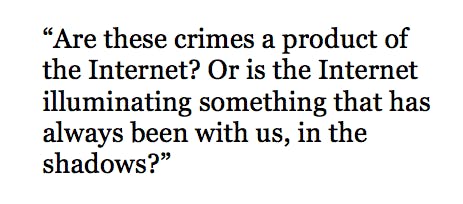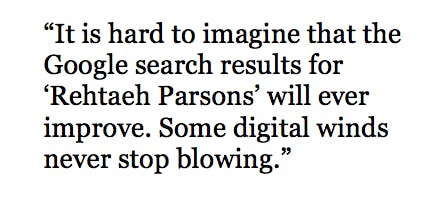It has become a shockingly familiar story: A young girl was the victim of a sex crime. Evidence of the crime was used to torture her for a period of months or years until she killed herself.
Such stories have become endemic online. They make international headlines every few months. They happen even more often.
Are these crimes a product of the Internet? Or is the Internet illuminating something that has always been with us, in the shadows? And if so, is that a good thing?
***
In the most recent case, a 17-year-old Nova Scotia girl named Rehtaeh Parsons was allegedly gang raped by four boys 18 months ago, when she was 15. Photos of the traumatic event circulated on social media and by email, “as if,” her father said, “it was a funny animation.”
 One photo shows a boy smiling for the camera, giving a big thumbs up.
One photo shows a boy smiling for the camera, giving a big thumbs up.
The heavily circulated photo inspired boys she went to school with to ask her for sex and girls to call her a slut.
The Royal Canadian Mounted Police took months to investigate, and when they did, they said there wasn’t enough evidence, photographs notwithstanding. They called it a “community issue,” rather than a “criminal” one.
School officials did nothing, saying they did not want to interfere with the police investigation. District officials seem never to have heard of it.
Rehtaeh changed schools several times, but it’s hard to get away from Facebook. Her father felt powerless. He took her to counseling. He prayed for her. He asked her what else he could do. She said she just wanted him to be her dad.
Last week, she locked herself in the bathroom at her house, and hung herself.
Sad as Rehtaeh’s story is, it is not unique. Amanda Todd was the last such victim to become world famous.
The truth is, this happens all the time.
***
Of course, the Internet didn’t invent rape, nor did it invent shaming the victim rather than the rapist—that’s a long-standing human tradition.
But the Internet surely made things worse for Amanda and for Rehtaeh. Digital photos, Facebook walls, and email have all turned the stray bullet of a note passed in study hall into something almost like a biological agent—once infected, the victim cannot get away from the disease, which is slow, painful, and fatal.
The Internet didn’t make teenagers more vicious, but it has given them weapons of mass destruction.
***
The survivors are doing their best to cope, but that too seems harder in the age of the Internet.
Rehtaeh’s family has put together a YouTube memorial for her. Her father has written a poignant blog post that paints a picture of a deeply caring young woman who loved animals and got straight A’s.
Explaining their posts, her father said:
“I don’t want her life to be defined by a Google search about suicide or death or rape. I want it to be about the giving heart she had. Her smile. Her love of life and the beautiful way in which she lived it.”
The family wants to remember the joy of Rehtaeh’s life, not the despair of her death. The Internet lets them publish that truth, alongside both the reports and discussion of her death and the evidence of the 18-month path to her death.
I suppose that’s something. When the hurricane is blowing, I guess it’s better to grab on to something and shout into the storm than it is allow yourself to be blown away.
Before the Internet, the hurricanes might blow; but eventually, those offline storms subsided, and people recovered. The mess could be cleaned up, people could move on.
It is hard to imagine that the Google search results for “Rehtaeh Parsons” will ever improve. Some digital winds never stop blowing.
***
What about the next Rehtaeh?
There will be more Rehtaehs, that is certain. In the short term, the Internet makes their lives worse; on a long enough timeline, however, the Internet does offer some hope that they will get the protection and the justice that Rehtaeh so sorely lacked.
The Internet is reacting very differently to Rehtaeh’s sad story than did the members of her own community. The Internet is outraged.
The same hurricane that threatens to sweep away her family will be merciless to those that failed Rehtaeh. School officials, law enforcement, the justice system—those in power whose job it is to provide justice do not want their Google results dominated by their failure to protect Rehtaeh any more than Rehtaeh’s father wants them dominated by rape.
Just as it may be too late for Rehtaeh’s family to change how the Internet remembers Rehtaeh, it is likely already too late for the officials who failed her to change how the Internet perceives them. Hopefully, it’s time for each of them to start their private sector career.
Ultimately that is what will protect the next Rehtaeh. When the next policeman, the next principal, and the next justice of the peace sees her case, he will know that he must do his job well or risk the wrath of the Internet—and the world.
So I hope that those harsh, cold digital winds of justice keep blowing: that the thunder claps, and the lightning strikes, and that not one voter in Nova Scotia ever forgets how Rehtaeh died.
Photo via Angel Rehtaeh/Facebook


